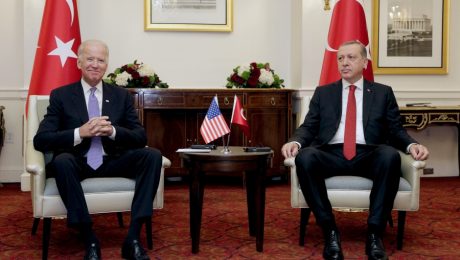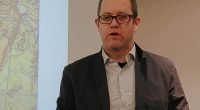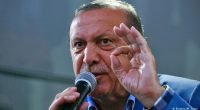Opinions

Turkish Prisons Are Filled With Professors — Like My Father
A Turkish professor who was my father’s colleague and frequently visited our house is now incapable of counting right amount of money to pay for a bottle of water at a prison canteen. He is traumatized as a result of days of harsh treatment during the interrogation. He is sharing a prison cell with my father, longtime friends, in western Turkey.

Financial Times: Turkey’s crackdown on dissent has gone too far
More troubling is evidence emerging that his government is now using the attempted coup as a pretext to round up all manner of troublesome opponents, not just the Gulenists. It is also damaging the fabric of Turkish society and undermining its institutions, including the security forces. That is a dangerous move in a country whose immune system is already weakened by jihadism and which is battling armed opponents on several fronts.

Twitter shouldn’t let itself become a tool for tyrants
Journalists have been in Mr. Erdogan’s crosshairs, and his campaign is pushing into the digital universe, too. Turkey is pressing Twitter to silence journalists, and Twitter must resist more vigorously. Twitter is a powerful force for free expression. “The tweets must flow,” the company likes to say. But they don’t always flow, as freedom of speech and democracy are in retreat around the globe.

Why Is Turkey Targeting Hizmet? Questions about Erdoğan’s Post-Coup Crackdown
In May 2009, I received an award at the International Turkish Olympiad. The event was sponsored and organized by members of the Hizmet movement and most of the performers were students of Hizmet schools abroad. When I, together with a handful of other recipients, mounted the stage to accept our awards, there to shake our hands was the smiling then prime minister of Turkey, Recep Tayyib Erdoğan.

Diplomatic Row over Gulen Influence in Africa
Turkey’s relations with African countries have been strained following demands by the Turkish government to close Gulenist schools in Sudan, Nigeria, and Somalia. After the attempted coup in Turkey on July 15, which the Turkish government has accused Gulen of masterminding, Turkey’s ambassador to Nigeria called for 17 Gulenist schools in the country to be closed.

Purge accelerates Islamist radicalization in Turkey
The ongoing purge leaves no room for doubt that the Turkish government is ready to go to any lengths to eliminate the Gülen movement. The current rise in homegrown Islamist radicalization is another sign that Turkey’s social fabric is undergoing a noxious change. The major effect of this change has been damage to the traditional mainstream understanding of Islam in Turkey.

Erdogan’s options: to propose and sponsor amendments at the US parliament or to provide evidence against Gulen
At separate meetings between President Obama, US Vice president Biden and President Erdogan of Turkey, the American justice system has technically made it very difficult and imposable for the unlawful demands of Erdogan to be met. However, the options available to Erdogan are number one, to propose and sponsor amendments at the US parliament, number two, is to provide evidences to his claims against Gulen.

Turkey After the July Coup Attempt – Alan Makovsky’s testimony before Committee on Foreign Affairs
The vastness and persistence of the purge of the civil service, arrests of journalists, and closure of media outlets—many seemingly having nothing whatsoever to do with the exiled Turkish preacher Fethullah Gülen or his Gülenist movement that the Turkish government blames for the coup attempt.

Debunking The Gülen-Erdoğan Relationship
Yes, at one time, there had been rapprochement and mutual support, but reality and history show that such an alliance has long been overstated. The truth is, Erdoğan and Gülen only came together when Erdoğan’s stated goals reflected deeply held beliefs by Gülen. As is often the case, perception is mistaken for reality. Gülen is not Erdoğan’s biggest threat, nor was he his chief ally.

Turkey’s Erdogan Is Already Making the Most of His ‘Gift From Heaven’ After Coup Attempt
Erdogan is establishing the regime he wants even if the constitution is not amended, a regime that ensures complete loyalty, whether out of support for him or out of fear he is instilling in tens of thousands of government officials, hundreds of thousands of teachers, thousands of judges and prosecutors and army officers. The shakeup in the education system is perhaps the most significant, even more than in the justice system or the army.

Turkey’s Opposition Fails a Critical Test: To Challenge Erdogan
The CHP’s inability to seize the moment and strongly condemn the arbitrary extent and nature of the purges from the start was a critical failure, and one that serves to undermine its integrity and sustainability as an opposition force. Despite tentative but welcome signs from the CHP towards highlighting the exponential injustices of Turkey’s ongoing purge, it still seems like a classic case of acting too little, too late.

Erdogan: A saint elsewhere, outside Turkey’s shores?
On a recent trip to Spain, I picked a copy of the International New York Times, and saw a story that shocked me greatly. It said Mr Erdogan had ordered the release of 38,000 prisoners serving various jail terms, for different offences, in order to make space for the so-called coup plotters who had no space in Turkey’s overflowing prison. I was totally shocked by the news because I can’t imagine a situation where convicted criminals are being set free just so political opponents can be locked up.




















